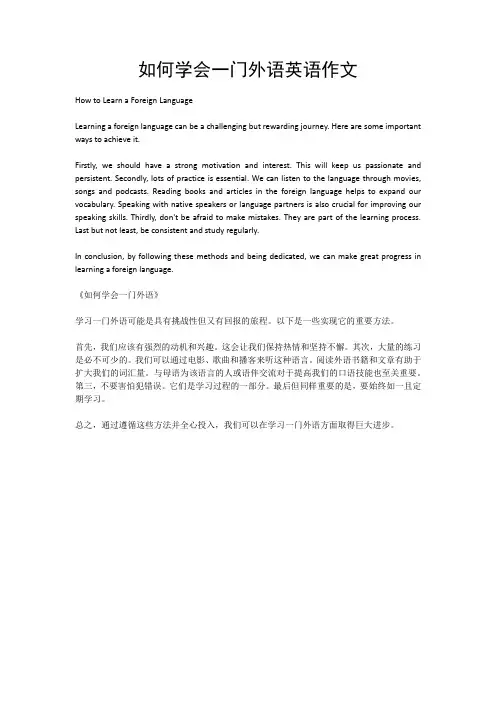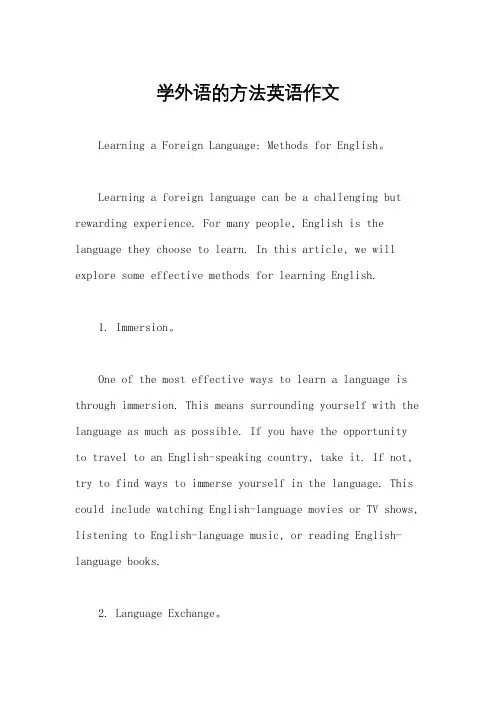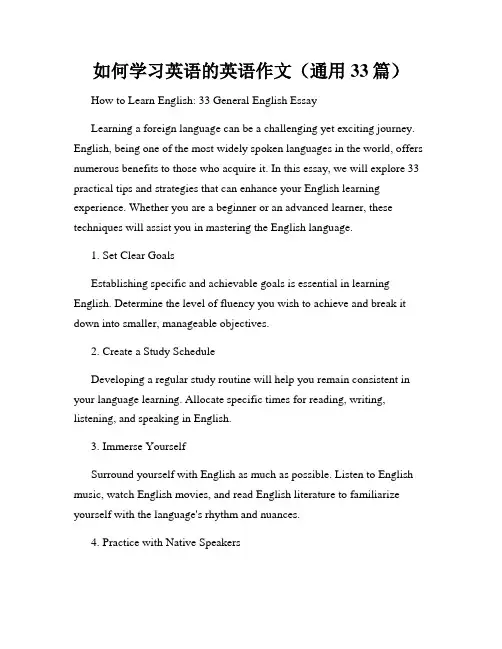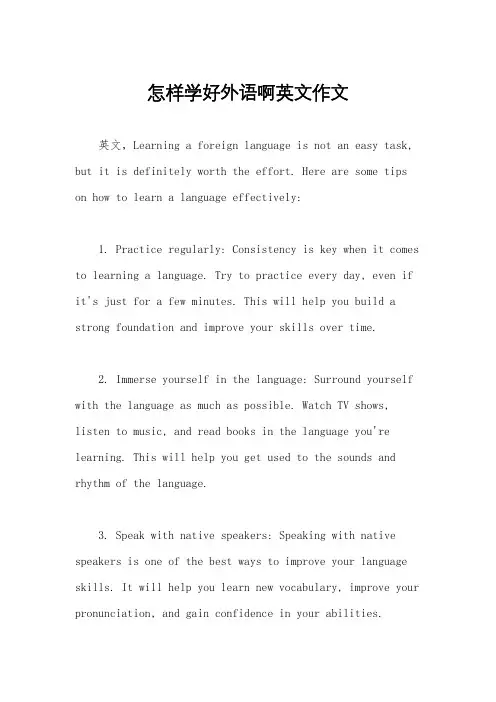如何学习外语 How to Learn a Foreign Language_英语作文
如何学会一门外语英语作文

如何学会一门外语英语作文How to Learn a Foreign LanguageLearning a foreign language can be a challenging but rewarding journey. Here are some important ways to achieve it.Firstly, we should have a strong motivation and interest. This will keep us passionate and persistent. Secondly, lots of practice is essential. We can listen to the language through movies, songs and podcasts. Reading books and articles in the foreign language helps to expand our vocabulary. Speaking with native speakers or language partners is also crucial for improving our speaking skills. Thirdly, don't be afraid to make mistakes. They are part of the learning process. Last but not least, be consistent and study regularly.In conclusion, by following these methods and being dedicated, we can make great progress in learning a foreign language.《如何学会一门外语》学习一门外语可能是具有挑战性但又有回报的旅程。
how to learn a foreign languagePPT课件

Goal
• To provide basic information necessary for a clear understanding of the “true” nature of learning a second language.
2
Quote
• “ A man who does not know a foreign language does not know his own.” ---Goethe
stored in long term memory; a structure 60 times • The Parts of Language Make the Whole • Repetition is the “Mother” of all Learning
11
Second Language Acquisition
8
General Reasons People Learn a Second Language…
• Personal • Professional • Social • Educational
9
What do People Generally Speak About?
• Family • Business • Personal Care • Travel • Food
• An understanding of second language acquisition can improve the ability of mainstream teachers to serve the culturally and linguistically diverse students in their classrooms (Fillmore & Snow, 2002; Hamayan, 1990). While significant professional development is necessary to gain a full understanding of second language acquisition theory, some key concepts can be quickly understood and applied in the classroom.
学外语的方法英语作文

学外语的方法英语作文Learning a Foreign Language: Methods for English。
Learning a foreign language can be a challenging but rewarding experience. For many people, English is the language they choose to learn. In this article, we will explore some effective methods for learning English.1. Immersion。
One of the most effective ways to learn a language is through immersion. This means surrounding yourself with the language as much as possible. If you have the opportunity to travel to an English-speaking country, take it. If not, try to find ways to immerse yourself in the language. This could include watching English-language movies or TV shows, listening to English-language music, or reading English-language books.2. Language Exchange。
Another effective method for learning English isthrough language exchange. This involves finding a language partner who is a native English speaker and who is also learning your native language. You can practice speakingwith each other, correcting each other's mistakes, and learning new vocabulary and grammar together.3. Online Resources。
如何学习英语的英语作文(通用33篇)

如何学习英语的英语作文(通用33篇)How to Learn English: 33 General English EssayLearning a foreign language can be a challenging yet exciting journey. English, being one of the most widely spoken languages in the world, offers numerous benefits to those who acquire it. In this essay, we will explore 33 practical tips and strategies that can enhance your English learning experience. Whether you are a beginner or an advanced learner, these techniques will assist you in mastering the English language.1. Set Clear GoalsEstablishing specific and achievable goals is essential in learning English. Determine the level of fluency you wish to achieve and break it down into smaller, manageable objectives.2. Create a Study ScheduleDeveloping a regular study routine will help you remain consistent in your language learning. Allocate specific times for reading, writing, listening, and speaking in English.3. Immerse YourselfSurround yourself with English as much as possible. Listen to English music, watch English movies, and read English literature to familiarize yourself with the language's rhythm and nuances.4. Practice with Native SpeakersEngaging in conversations with native English speakers is invaluable in improving your language skills. Join language exchange programs or find language partners online to practice speaking and receive feedback.5. Utilize Online ResourcesTake advantage of the vast number of online resources available for English learners. Websites, mobile apps, and online courses offer interactive exercises, video lessons, and grammar tutorials.6. Use FlashcardsUtilize flashcards to learn new vocabulary words. Write the English word on one side and the translation or definition on the other. Review them regularly to reinforce your memory.7. Read ExtensivelyReading English texts, such as books, newspapers, and magazines, exposes you to various sentence structures and vocabulary. Start with simpler materials and gradually progress to more complex texts.8. Keep a Vocabulary JournalMaintain a vocabulary journal to record new words and expressions. Write down their meanings, synonyms, and example sentences to reinforce your understanding. Review the journal periodically.9. Watch English TV Shows and MoviesWatching English TV shows and movies with subtitles can help improve your listening skills and familiarize you with everyday conversations.10. Take NotesWhen studying English grammar or learning new vocabulary, take notes to reinforce your understanding. Summarize the main points and review them regularly.11. Engage in English-Speaking CommunitiesJoining online forums, social media groups, or language exchange communities allows you to interact with English speakers from around the world. Participate in discussions and ask for advice.12. Enroll in a Language CourseConsider enrolling in a formal English language course, either online or in-person. Qualified teachers can provide guidance, monitor your progress, and offer personalized feedback.13. Practice Speaking AloudSpeak English out loud, even when you are alone. Practice pronunciation, intonation, and rhythm to develop fluency and build confidence.14. Write RegularlyCommit to writing in English regularly. Start with simple sentences and gradually progress to more complex paragraphs and essays. Ask for feedback from native speakers or language teachers.15. Use Language Learning AppsThere are various language learning apps available that offer interactive exercises, games, and quizzes to enhance your English skills. Dedicate a few minutes each day to these apps.16. Study GrammarEnglish grammar can be complex, but understanding its rules is crucial. Study grammar topics systematically and practice applying them in your speaking and writing.17. Test YourselfRegularly assess your language skills by taking practice tests or using online language proficiency assessment tools. Identify areas of improvement and focus on strengthening those areas.18. Develop Listening SkillsListen to English podcasts, audiobooks, or news broadcasts to improve your listening comprehension. Start with slower-paced materials and gradually move on to more challenging content.19. Travel to English-Speaking CountriesImmersing yourself in an English-speaking environment through travel allows you to practice your language skills in real-life situations. Communicate with locals and engage in conversations.20. Make English-Speaking FriendsActively seek out English-speaking friends or join language exchange programs. Regular communication with native speakers accelerates your progress and exposes you to colloquial expressions.21. Use English in Daily ActivitiesIncorporate English into your daily activities. Label items in your home with their English names, think in English, or use English while cooking or doing household chores.22. Participate in Role-Playing ActivitiesEngage in role-playing activities with friends or language partners to simulate real-life conversations. Practice various scenarios, such as ordering food at a restaurant or asking for directions.23. Listen to English MusicListen to English songs and try to understand the lyrics. Sing along to improve your pronunciation and intonation. Look up the lyrics and their meanings to deepen your understanding.24. Attend English Language MeetupsCheck for English language meetups or conversation clubs in your area. These informal gatherings encourage participants to communicate in English and provide an opportunity to make new friends.25. Learn through ContextLearn new vocabulary and expressions in context rather than isolated words. Pay attention to how words are used in sentences and try to understand their meanings through context clues.26. Use English-English DictionariesInstead of relying solely on translation dictionaries, utilize English-English dictionaries to learn new words. This way, you can develop a deeper understanding of their usage and connotations.27. Listen to English RadioTune in to English radio stations or podcasts during your commute or leisure time. This will expose you to natural conversations, various accents, and different topics.28. Join Language Learning ChallengesParticipate in language learning challenges or competitions that encourage daily practice and progress. These challenges often provide a supportive community and motivates you to stay consistent.29. Embrace MistakesDo not be afraid to make mistakes. Making errors is a natural part of the learning process. Embrace them as opportunities for growth and learning.30. Stay MotivatedMaintaining motivation is crucial during the language learning journey. Set rewards for yourself upon reaching specific milestones or find an accountability partner to keep you motivated and focused.31. Practice Speaking in Front of a MirrorStand in front of a mirror and practice speaking English. Observe your facial expressions, gestures, and body language to improve your communication skills.32. Celebrate Your ProgressAcknowledge and celebrate every milestone you achieve in your English learning journey. Reflect on how far you have come to stay motivated and remind yourself of your accomplishments.33. Never Give UpFinally, stay persistent and never give up. Learning a language requires time and effort. Even during challenging times, remember your goals and the benefits of becoming proficient in English.In conclusion, learning English requires dedication, consistency, and a variety of approaches. By implementing these 33 tips and strategies, you can enhance your English language skills and embark on a successful language learning journey. Remember, practice makes perfect, and every step you take brings you closer to fluency. Happy learning!。
Unit1 How to learn a foreign language

Do you think computer can help learn English?
Warm-up Words for discussion
to be faced with grammar rules
T
pronunciation vocabulary
cultural background
communicate with people exchange ideas with native people suitable for me Regular classroom study
Teaching Procedures
Warm-up
T
Global Reading
Detailed Reading
Homework
Why do you study English
Watch a Video
T
Warm-up
Discuss in pairs:
What problems do you have in trying to learn English in your middle school ?
positive adj.
① effective; helpful
Translation 别只是看着我,给我提些积极的建议吧。
T
Key
Don’t just watch me; give me some positive advice.
反义词
negative (消极的,负面的,否定的)
“worrying about making mistakes” 是现在分 词短语作状语 e.g.
T
Climbing to the top ofto the tower, When we climbed the top of the tower, we saw a beautiful sight. Not Because wanting he to meet John there, didn’t want to meet John there, he refused to attend the party.
怎样学好外语啊英文作文

怎样学好外语啊英文作文英文,Learning a foreign language is not an easy task, but it is definitely worth the effort. Here are some tips on how to learn a language effectively:1. Practice regularly: Consistency is key when it comes to learning a language. Try to practice every day, even if it's just for a few minutes. This will help you build a strong foundation and improve your skills over time.2. Immerse yourself in the language: Surround yourself with the language as much as possible. Watch TV shows, listen to music, and read books in the language you're learning. This will help you get used to the sounds and rhythm of the language.3. Speak with native speakers: Speaking with native speakers is one of the best ways to improve your language skills. It will help you learn new vocabulary, improve your pronunciation, and gain confidence in your abilities.4. Set goals: Setting goals will help you stay motivated and focused. Whether it's to pass a language exam or to be able to have a conversation with a native speaker, having a clear goal in mind will help you stay on track.5. Be patient: Learning a language takes time and effort. Don't expect to become fluent overnight. Be patient with yourself and celebrate small victories along the way.中文:学习外语并不是一件容易的事情,但是它绝对值得我们付出努力。
如何学会国外语言英语作文
如何学会国外语言英语作文How to Learn a Foreign Language: English。
Learning a foreign language can be a daunting task, but it is also an incredibly rewarding experience. English, as one of the most widely spoken languages in the world, is a great language to learn. Here are some tips on how to learn English effectively.1. Start with the basics。
Before diving into complex grammar rules and vocabulary, start with the basics. Learn the alphabet, numbers, and common phrases. This will provide a strong foundation for your language learning journey.2. Immerse yourself in the language。
The best way to learn a language is to immerse yourself in it. Watch English movies and TV shows, listen to Englishmusic and podcasts, and read English books and articles. This will help you get used to the language and improve your listening and comprehension skills.3. Practice speaking。
英语演讲如何学好一门外语
英语演讲如何学好一门外语Good morning, everyone. Today, I want to talk to you about how to learn a foreign language. Learning a new language can be a daunting task, but with the right approach and dedication, anyone can achieve fluency in a foreign language. In this speech, I will share some tips and strategies that can help you learn a new language effectively.First and foremost, it is important to set clear goals for yourself when learning a new language. Ask yourself why you want to learn this language and what level of proficiency you hope to achieve. Setting specific and achievable goals will help you stay motivated and focused throughout your language learning journey.Next, immerse yourself in the language as much as possible. This can be done by listening to music, watching movies, or reading books in the target language. Surrounding yourself with the language will help you become more familiar with its sounds and structure, making it easier for you to pick up new words and phrases.Practice speaking the language as often as you can. This could be by finding a language exchange partner or joining a conversation group. The more you practice speaking, the more confident you will become in using the language in real-life situations. Don't be afraid to make mistakes – they are a natural part of the learning process and will help you improve over time.Another important aspect of language learning is building a strong vocabulary. Make it a habit to learn new words and phrases every day and try to use them in context. Flashcards and language learning apps can be helpful tools for expanding your vocabulary quickly.Grammar is also crucial when learning a new language. Take the time to study the grammar rules of the target language and practice applying them in your writing and speaking. Understanding how the language is structured will help you communicate more effectively and avoid common mistakes.Lastly, don't forget to be patient with yourself. Learning a new language takes time and effort, so don't get discouraged if you don't see progress right away. Celebrate small victories along the way and stay motivated by reminding yourself of your goals and the reasons why you chose to learn the language in the first place.In conclusion, learning a foreign language is a rewarding experience that can open up a world of opportunities and connections. By setting clear goals, immersing yourself in the language, practicing speaking, building vocabulary, studying grammar, and being patient, you can achieve fluency in a new language. Remember that language learning is a journey, not a destination, so enjoy the process and have fun exploring a new culture through its language. Thank you for listening.。
unit 1 how to learn a foreign language
Teaching Objectives:1.To grasp the main idea and structure of the text;2.To appreciate the writing model demonstrated in the text (General Statement +Specific Details + Conclusion);3.To familiarize with the way to develop a paragraph --- cause and effect;4.To master the important language points and key sentence patterns.Stage I Pre-reading ActivitiesI. Warm-up activities (10minutes)1) When and where did you begin to learn English?— I began to learn English... years ago.— I have learned English for...— My experience with English began in... when...2) Do you enjoy learning English? Why?—No, I don’t enjoy it because it is useless / too difficult.— Y es, I enjoy it very much. It can help mefind a good job after graduation.learn the cultures of other countries.make some foreign friends.learn the value of hard work.3) How was your English teacher in junior or senior middle school?—My English teacher in... was kind/patient/encouraging/strict/impatient/cold/always angry.4) Do you have any trouble learning English? If any, what is it?— I always feel it difficult to...—It’s not easy for me to…understand what others say.remember so many words.understand the grammar.read quickly.speak in public.5) What are the advantages of learning English online?equal opportunity to do...any place, any time or pacecheaper and more convenientquicker and easier to get access tomuch information and to teachersstudent-centeredno limit to the number of studentsII. Background Knowledge1. Online learning: Online learning, a form of distance education, refers to learning and other supportive resources that are available through the Internet. In an online lesson, studentswork with a computer program to select the materials they should be studying. The materials can be presented as text, graphics, animated graphics, audio, video, or a combination of these that are displayed in Web browsers or other multimedia players such as Windows Media Player.2. Junior middle school: In the US,it refers to a school for children who are twelve to fifteen years old while in Britain it refers to a school for children aged seven to eleven years.3. Senior middle school: It refers to a stage of education after junior middle school and before college or university.4. Primary and secondary school:Begins around age six for US children. They attend five or six years of primary school. Next they go to secondary school, which consists of either a two-, three-year program or a four-year program. This is called “middle school” or “junior high school” and “senior high school “ (often just called “high school”).Stage II While-reading ActivitiesIII Global Reading1. Understanding the major details of the textMain idea of the textLearning a foreign language was one of the most rewarding experiences the writer has had. Organization of the textIntroductory remarks: The author presents readers with his own language learning experiences at different stages. And at different stages, the author met different teachers a nd consequently formed different attitudes towards English learning.1. Part Division of the TextPart I (1) Introduction Learning a foreign language was one of the most rewarding experiences the writer has had.Part II (2-7) The author’s four stages of learning the foreign language Language learning experiences from junior middle school to senior middle school to college and then to online learning. There is also comparison between traditional learning and online learning.I. In junior middle school (Para.2):The teacher: kind and patient, positive, often praising the studentsThe author: at the top of my class, eagerly answering all the questions, never worrying much about making mistakesII. In senior middle school (Para.3):The teacher: punishing quickly, pointing a long stick at us and shaking it up and down, shouting “No! No! No!”The author: losing my eagerness, losing my joy, losing my desireIII. At college (Para.4):The teacher: patient and kind, no pointed sticksThe classes: very large, many students spoke much better than I didThe author: feeling intimidated, afraid to speak, staying at the same levelIV. The on-line learning (Paras.5—7):The on-line learning requires: much time, commitment, disciplineThe author (at the beginning): making many mistakes, crying out of frustration, feeling like giving upThe author (finally): reaping the benefits of all the hard workPart III (8) Conclusion Summarizes the writer’s experiences in learning a foreign language. Through the learning process, the writer learned the value of hard work, gained insights into another culture, and opened his mind to new ideas.Four benefits:1. Teaching me the value of hard work.2. Giving me insights into another culture.3. Enabling me to communicate with more people.4. Being able to bridge the gap between my language and theirs2. Structure AnalysisA. The Writing Model of Passage A:General Statement + Specific Details + Conclusion1)What is the General Statement?2)What are the specific details?3)What is the conclusion?The General Statement (the Main Idea)Learning a foreign language was one of the most difficult yet most rewarding experiences of my life.(Para.1)The Specific DetailsEnglish Learning Experiences:Difficult : a. in senior middle school. (Para. 3)b. at college. (Para.4 )Rewarding :a. in junior middle school (Para. 2)b. with the online course. ( Paras.5—7 )ConclusionLearning a foreign language has been a most trying experience for me, but one that I wouldn’ t trade for anything. (Para. 8)B. The way to develop paragraphs: Cause and EffectTopic→Cause→EffectThe paragraph begins with a general statement about what is to be talked about. (Topic)Next comes the major factor or factors that result in the effect as expected. (Cause)As a conclusion, an effect shows what the cause or causes have produced on the concerned. (Effect)The cause and effect technique can make clear the reasons why something happens by showing the relation between cause and effect.List the cause and effect of Para. 2, 3, and 4.Para. 2 Cause: The kind and patient teacher often praised the students.Effect: I eagerly answered questions, not worrying about making mistakes. I was atthe top of my class.Para. 3 Cause: The new teacher quickly punished those who gave wrong answers.Effect: I lost my eagerness to answer questions and my desire to say anything inEnglish.Para. 4 Cause: Large classes made me only able to answer a couple of questions in each class period. Many students spoke much better than I did.Effect: I was afraid to speak. My English seemed to stay at the same level.Detailed Readingnguage Points(50minutes)Para. 11. rewardvt. to give something in return for good and valuable doingsreward sb. with sth.; reward sb. for sth/doing sth;Our hard work was finally rewarded. 在奥运会上的成功使他的努力得到了报偿。
怎么学外语的英文作文
怎么学外语的英文作文英文:Learning a foreign language can be a challenging but rewarding experience. As someone who has studied multiple languages, I have found that there are a few key strategies that have helped me along the way.Firstly, it is important to immerse yourself in the language as much as possible. This can be done through watching TV shows or movies in the target language, listening to music, or even just reading books or news articles. The more exposure you have to the language, the easier it will be to understand and retain.Another important aspect is practice. It is not enough to simply memorize vocabulary and grammar rules you must actively use the language in order to truly learn it. This can be done through conversation partners, language exchange programs, or even just speaking to yourself in thetarget language.Additionally, I have found that setting specific goals for myself has been helpful. For example, I may aim to read a certain number of pages in my target language each day, or to have a conversation entirely in that language. These goals give me something to work towards and help me to stay motivated.Finally, it is important to be patient with yourself. Learning a language is a long process, and there will be times when it feels frustrating or overwhelming. However, with persistence and dedication, anyone can become proficient in a foreign language.中文:学习外语可能是一项具有挑战性但有回报的经历。
- 1、下载文档前请自行甄别文档内容的完整性,平台不提供额外的编辑、内容补充、找答案等附加服务。
- 2、"仅部分预览"的文档,不可在线预览部分如存在完整性等问题,可反馈申请退款(可完整预览的文档不适用该条件!)。
- 3、如文档侵犯您的权益,请联系客服反馈,我们会尽快为您处理(人工客服工作时间:9:00-18:30)。
如何学习外语How to Learn a Foreign Language
Speaking of the ways to study a foreignlanguage, different people have different opinions on this. Some believe weshould go to a certain country. Some think we should register in a trainingclass. Some think we should practice quite often. In my opinion, I think we canlearn a foreign language from three main ways.
说起学一门外语,不同的人有不同的意见。
一些人认为我们应该去特定的国家学习。
一些人认为我们应该上培训班学习。
一些人认为我们应该经常练习。
就我来说,我认为学外语有三种主要的方法。
First of all, we should try to do manylistening practice. If you want to learn a foreign language, it is importantfor you to understand what people say. So, we should find many listeningmaterials to practice our listening skills.
首先,我们应该多做听力练习。
如果你要学一门外语的话,你必须能够听懂别人在讲什么。
所以,我们应该多找些听力材料练习我们的听力。
Secondly, we should say as much aspossible. It is a common phenomenon that most students are poor in oral speaking.The reason is that most students don’t dare to speak and have
little chance topractice oral speaking. However, if we learn a language, we must encourageourselves to say as much as possible. Besides, we can work with our friends andclassmates to practice oral speaking together.
其次,我们应该多说。
许多学生的口语很差已经是一个很普遍的现象。
原因在于很多学生不敢讲,而且又没有机会开口练习。
但是,如果我们要学习一门外语的话,我们应该多开口讲。
另外,我们可以跟朋友和同学一起练习口语。
Thirdly, to master a language, we shouldpractice writing. When we learn a language, it is essential for us to writecompositions. By writing, we can improve our learning skills.
最后,要掌握好一门外语,要多练习写作。
写作对于学外语来说很有必要。
通过写作,我们能够提高我们的学习技巧。
All in all, if we want to learn a certainkind of language, we should not only practice our listening and writing skills,but we should try to speak as much as possible.
总之,我们在学习外语的时候,不仅要锻炼我们的听力和写作技巧,而且我们应该尽可能多开口练习。
